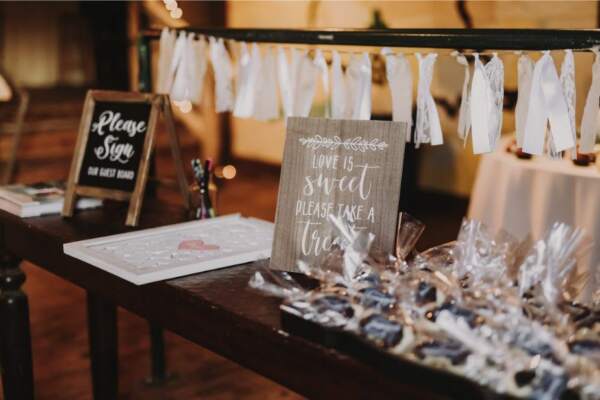Comprehensive Venue Selection Checklist: Finding the Perfect Setting for Your Event
Last Updated on March 13, 2024 by Project Party
Selecting the perfect venue is not just a task; it’s an art form crucial in orchestrating a truly memorable event or wedding. The venue serves as the canvas upon which every aspect of your occasion is painted, from the ambience that envelops your guests to the logistical flow that ensures everything runs seamlessly. Embarking on the journey of event venue selection is akin to curating an experience, where every detail contributes to the overall impression and success of your event. To guide you through this process and guarantee that every facet aligns with your vision and requirements, utilize this comprehensive checklist. With each point meticulously addressed, you’ll be well-equipped to craft an unforgettable event that resonates with everyone who attends.
1. Locale Lure: Location Selection
Choosing a venue in a convenient location is crucial in event venue selection, as it ensures ease of access for your guests and impacts transportation logistics. Consider whether you’ll need to arrange shuttles or buses to transport attendees to and from the venue. By prioritizing location suitability, event planners can minimize logistical challenges and enhance the overall guest experience, ensuring seamless arrival and departure for all participants.
- Is the venue easily accessible by major roads or public transportation?
- Are there nearby accommodations for out-of-town guests?
- How does the venue’s location contribute to the overall atmosphere and theme of your event?
- Are there nearby parking facilities for guests, and does the venue offer valet services?
- Does the venue have a backup plan for unexpected transportation issues, such as road closures or traffic delays?
Importance: High. The venue’s location can significantly affect guest attendance and overall convenience, making it a top priority on your checklist.
2. Spacious Spectacle: Size and Capacity Dynamics
The size of the venue is a critical factor in event venue selection, as it directly impacts both guest comfort and budget considerations. Oversized venues may incur unnecessary costs, while undersized ones can compromise the guest experience. By carefully assessing the venue’s size relative to your event requirements, you can optimize both budget allocation and attendee satisfaction, ensuring a well-suited venue that meets your needs effectively.
- Does the venue comfortably accommodate your expected guest count while allowing space for activities and movement?
- Are there options for flexible seating arrangements or partitioning to accommodate different event formats?
- How does the venue size impact rental costs and budget allocation?
- Does the venue provide a floor plan or layout to help you visualize the event space?
- How does the venue manage capacity during peak seasons or high-demand dates?
Importance: High. Ensuring the venue’s size and capacity align with your guest list is crucial for a seamless and enjoyable event experience.
3. Atmosphere Alchemy: Crafting Ambience and Style
The ambience and style of the venue play a pivotal role in event venue selection, as they set the tone for your event and contribute to its overall aesthetic appeal. It’s crucial to consider how the venue’s atmosphere complements your event theme and desired vibe. By prioritizing this aspect, event planners can ensure a seamless integration of the venue’s ambiance with the intended event atmosphere, creating a cohesive and visually appealing experience for attendees.
- Does the venue’s aesthetic align with your event theme and vision?
- Can you personalize or decorate the space to reflect your unique style?
- How does the venue’s ambience enhance the overall guest experience and atmosphere?
- Does the venue offer unique architectural features or design elements that add to its charm?
- How does natural lighting or specific lighting options contribute to the ambience?
Importance: Moderate to High. The ambience and style of the venue play a significant role in creating the desired atmosphere for your event, making it essential to align with your vision.
4. Amenities Oasis: Services and Offerings
Access to essential amenities and services is paramount in event venue selection, as they can streamline event planning and enhance the guest experience significantly. It’s crucial to evaluate the venue’s offerings and restrictions thoroughly to ensure they align with your needs and preferences. By prioritizing these considerations, event planners can select a venue that provides the necessary support and resources for a successful event.
- What amenities does the venue provide, such as catering, audiovisual equipment, or décor options?
- Are there any restrictions on outside vendors or services you plan to bring in?
- How do the venue’s amenities and services contribute to the overall convenience and success of your event?
- Is there in-house catering, and if so, can they accommodate dietary restrictions or special menu requests?
- How does the venue handle audiovisual needs, and is technical support provided during the event?
Importance: Moderate. While amenities and services can enhance the event experience, their importance may vary depending on your specific requirements and budget.
5. Flexi-Flow: Accessibility and Adaptability
Crucial considerations in event venue selection include the venue’s flexibility in accommodating event needs and accessibility for guests with disabilities. It’s imperative to ensure the venue can adapt to your event format and address any accessibility requirements effectively. By prioritizing these aspects, event planners create an inclusive and accommodating environment, fostering a positive experience for all attendees while ensuring that the event runs smoothly and meets the needs of diverse participants.
- Is the venue available on your preferred date and time, and are there any restrictions on event duration?
- How flexible is the venue in accommodating indoor and outdoor spaces or different event formats?
- Does the venue offer accessibility features for guests with disabilities, such as ramps or accessible restrooms?
- Can the venue accommodate unique event setups or installations?
- How does the venue handle last-minute changes or unforeseen circumstances?
Importance: Moderate. Flexibility and accessibility are essential for ensuring the smooth execution of your event and accommodating the needs of all attendees.
6. Budget Bliss: Navigating Pricing Realities
Thoroughly understanding the venue’s pricing structure and any additional costs is crucial in event venue selection. Staying within budget is vital for the event’s success. It’s essential to obtain a detailed breakdown of all costs, including rental fees, staffing, and any additional charges. By doing so, event planners can avoid unexpected expenses and ensure that the chosen venue aligns with their financial constraints while meeting their event needs effectively.
- Have you clarified if there are any hidden fees or unexpected expenses that could impact your budget?
- How does the venue’s pricing compare to your allocated budget, and are there opportunities for negotiation or cost-saving measures?
- Does the venue offer customizable packages to fit different budget ranges?
- Are there payment plans or financing options available to ease budget constraints?
- Are there any discounts or incentives available for booking certain dates or times?
Importance: High. Understanding the venue’s pricing and its alignment with your budget is crucial for financial planning and overall event success.
7. Convenience Cornerstone: Accessibility and Accommodations
Inclusivity and guest comfort are paramount considerations in event venue selection. Ensuring the venue’s accessibility to all guests and its ability to accommodate special requirements is essential. By prioritizing inclusivity, event planners create an environment where all attendees feel welcome and valued. This approach enhances the overall guest experience and contributes to the success and reputation of the event. Taking these factors into account fosters an inclusive and accommodating atmosphere for all participants.
- Does the venue offer accessibility features for guests with disabilities, such as ramps or accessible restrooms?
- Are accommodations available for special needs, such as dietary restrictions or childcare?
- How does the venue prioritize guest comfort and inclusivity in its offerings?
- Are there designated spaces for vendors to set up, rest, or prepare during the event?
- How does the venue handle storage or secure areas for valuable items during the event?
Importance: Moderate. Accessibility and accommodations contribute to the overall guest experience and demonstrate a commitment to inclusivity and hospitality.
8. Reputation Rendezvous: Trustworthy Reviews and Raves
Considering the venue’s reputation and past client experiences is integral when making decisions regarding event venue selection. These factors offer valuable insights into the venue’s reliability, service quality, and overall satisfaction levels. By thoroughly researching feedback and testimonials, event planners can make informed choices, ensuring that the selected venue aligns with their expectations and delivers a memorable and successful event experience.
- Have you researched the venue’s reputation within the event planning community and among past clients?
- Have you looked for reviews or testimonials to gauge satisfaction levels and potential concerns?
- How does the venue’s reputation and client feedback influence your confidence in its suitability for your event?
- Does the venue have experience hosting similar events, and can they provide references?
- How does the venue handle negative feedback or address concerns raised by previous clients?
Importance: Moderate. While reputation and reviews offer valuable insights, they should be considered alongside other factors in your decision-making process.
9. Logistics Luminary: Event Support and Coordination
Access to on-site event coordination or support staff is a valuable consideration in event venue selection. Such resources alleviate the burden of planning and execution, ensuring a smooth and stress-free event experience for organizers and attendees alike. With dedicated professionals assisting throughout the process, from setup to breakdown, event hosts can focus on delivering a memorable event while relying on the expertise and assistance provided by the venue’s team.
- Does the venue provide on-site event coordination or support staff?
- Are there resources available, such as planning guides or vendor recommendations, to assist with event logistics?
- How does the venue’s support infrastructure contribute to the overall efficiency and success of your event?
- Can the venue provide a timeline or schedule for the event day to coordinate logistics?
- What emergency protocols does the venue have in place to handle unforeseen issues during the event?
Importance: Moderate. Event logistics and support services can streamline the planning process and enhance the overall event experience, particularly for larger or more complex events.
10. Weather Wizardry: Contingency Plans and Precautions
When engaging in event venue selection, particularly for outdoor events, establishing contingency plans for inclement weather is paramount. These plans serve as crucial safeguards to mitigate risks and ensure the event proceeds seamlessly, regardless of weather conditions. Whether it involves securing indoor backup spaces or implementing protective measures such as tents or shelters, prioritizing contingency planning ensures a resilient and successful event, enhancing attendee experience and satisfaction.
- What contingency plans does the venue have in place for adverse weather conditions?
- Is there availability of indoor backup options or provisions for tent rentals?
- How do the venue’s weather contingency plans ensure the success and resilience of your event?
- Can the venue provide examples of successful events they have hosted despite challenging weather conditions?
- Are there any additional costs or considerations associated with implementing weather contingency plans?
Importance: Moderate. Weather contingency plans are crucial for managing risks and maintaining event continuity, particularly for outdoor events or those held during unpredictable seasons.
11. Protection Paradigm: Insurance and Liability Shields
In the process of event venue selection, it’s paramount to grasp the venue’s insurance coverage and liability policies. This understanding serves as a crucial safeguard against potential risks and liabilities inherent in event hosting. By ensuring comprehensive insurance coverage aligns with your event’s needs, you mitigate potential financial and legal challenges. Prioritizing this aspect not only ensures protection for all stakeholders but also contributes to a smooth and secure event execution.
- Does the venue carry liability insurance to cover any accidents, damages, or unforeseen incidents that may occur during your event?
- Are there any insurance requirements or waivers that you need to address when booking the venue or bringing in outside vendors?
- How do the venue’s insurance and liability policies mitigate risks and protect all parties involved?
- Will understanding the venue’s insurance coverage and liability provisions ensure peace of mind and safeguard against potential risks and liabilities associated with hosting events?
- Is there a requirement for event organizers or vendors to provide proof of insurance coverage?
Importance: High. Clarifying insurance and liability provisions is critical for safeguarding against unforeseen incidents and ensuring peace of mind throughout the event planning process.
12. Silence Seeker: Noise Management and Curfew Considerations
When engaging in event venue selection, it’s essential to factor in noise restrictions and curfews imposed by the venue or local regulations. Ensuring compliance with these regulations not only fosters a harmonious relationship with the surrounding community but also minimizes disruptions to neighbouring areas. By carefully considering and adhering to noise limitations, you can create a seamless and enjoyable event experience for all attendees while respecting the venue’s guidelines and local ordinances.
- Are there any noise restrictions or curfews imposed by the venue or local ordinances that may impact your event timing or entertainment choices?
- Are there designated quiet hours or noise mitigation measures in place to minimize disruptions to neighbouring residents or businesses?
- How do the venue’s noise and curfew policies impact event planning and execution?
- Will understanding and adhering to noise and curfew restrictions ensure compliance with regulations and maintain harmonious relationships with the surrounding community?
- Is there a possibility of extending noise curfews or obtaining special permits for specific events?
Importance: Moderate. Noise and curfew restrictions are essential considerations for ensuring compliance with regulations and maintaining harmonious relationships with the surrounding community.
Crafting Perfection: A Comprehensive Guide to Event Venue Selection
As you embark on the venue selection process, remember that each aspect plays a significant role in shaping the success and experience of your event or wedding. By methodically evaluating venues against this comprehensive checklist, you can make informed decisions that align with your vision, priorities, and budget. While some considerations may carry more weight than others based on your specific event needs, addressing each point ensures thorough planning and seamless execution. With careful consideration and attention to detail, you’ll find the perfect venue to bring your event vision to life.
Related Posts
The Top 8 Hospitality Event Staff to Consider Hiring for Your Next Party
Are you in the throes of planning a memorable event and searching for the perfect hospitality event staff? You've landed in the right place! This…
July 13, 2020
Breaking Tradition: 17 Unique and Unconventional Wedding Venues to Consider
As the world evolves, so too do our ideas of what makes a perfect wedding. The traditional church setting, though timeless, is no longer the only…
November 2, 2023
14 Unique Wedding Venues You’ve Never Thought of (Neither Have Your Guests)
In the ever-evolving world of weddings, the hunt for unique wedding venues is gaining momentum. More and more couples are seeking out-of-the-ordinary…
January 11, 2021


